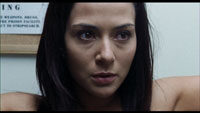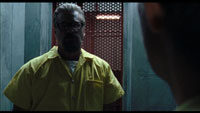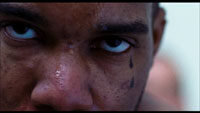***/**** Image A Sound A- Extras B-
starring Stephen Dorff, Harold Perrineau, Marisol Nichols, Val Kilmer
written and directed by Ric Roman Waugh
by Bryant Frazer If Jeffrey Lebowski had made a few wrong turns in life–if, let's say, he had brutally murdered some very bad men, as well as their families–he may have turned out not entirely unlike John Smith, the hulkingly mellow convict played by a moustachioed, goateed Val Kilmer in Felon. Judging from the wide berth the rest of the inmates give him, Smith is known as the silent-but-deadly type. Kilmer plays him from behind a whole bunch of prison tattoos with a steely glare, but also with a kind of openness that doesn't immediately compute. Although he's tagged as a sociopath, he's really just the opposite. He believes in justice, and he longs for the death sentence he feels his crimes deserve.
|
In Felon, Smith functions as a sort of guardian angel for imprisoned family man Wade Porter (Stephen Dorff, in an impressively tense and physical performance). As the film opens, Porter has just received approval for a small-business loan that will help him build the good life for his wife (Marisol Nichols) and young son (Vincent Miller). In a movie like this, of course, that's merely a perfunctory set-up for a fall. Porter awakens in the night to find a burglar in his home. He chases him out of the house and almost onto the sidewalk with a baseball bat before taking a single swing that connects with the thief's head, knocking the life right out of the guy. For accidentally killing the unarmed intruder, Porter is sentenced to three years in a state penitentiary.Prison is a trial by fire for the unassuming Porter, who quickly learns his lessons in fighting, forming uneasy alliances, and not being a snitch. The relative ease with which he takes to prison politics earns him the scorn of resident bad lieutenant William Jackson (Harold Perrineau), a prison guard who turns out to be pure psycho, pitting convicts against each other for chuckles. Jackson has Porter incarcerated in "the SHU," prison-speak for a special unit that holds criminals with disciplinary issues; as weeks stretch into months, Porter is hardened not only by the violence of prison life, but also by Lieutenant Jackson's rampant misanthropy. Meanwhile, the wife he leaves behind starts to lose patience. (When she asks him if he's turning into a skinhead, his response is, "I don't expect you to understand.") It's Porter's relationship with cellmate Smith, newly transferred from San Quentin, that keeps him sharp in the yard–where the prisoners gather to beat the hell out of one another for an hour a day–and, natch, puts him back in touch with his humanity.
If it all sounds pretty pat, well, it is. But Felon is compulsively watchable, largely because of its entertainingly big performances. In the first act, as the hapless, almost comically overmatched Porter arrives in prison, his status as prey is telegraphed by a soft blonde haircut that says "suburbs." Even then, Dorff displays a quiet intensity that effectively conveys his character's fear and desperation. Porter's transformation into a hard-eyed, muscular fighter with close-cropped hair is fairly startling–he starts to resemble the white-power gangsters who offer him protection. Kilmer, dispensing tough, fatherly advice about choosing friends and influencing people, dances precariously on the right side of the line that separates pulp from pabulum. And Perrineau slips regularly into black humour, relishing the contrast between Jackson's fiery sadism inside the prison and the absurd, glad-handing front he puts on when he's off duty.
Lots of credit is due writer-director Ric Roman Waugh: a long-time stuntman, he understands the best conventions of the B-movie and appreciates narrative economy. (Felon is one of the first releases from Stage 6, a new division of Sony Pictures dedicated to low-budget titles.) Felon was shot by cinematographer Dana Gonzales in Super16–which lends the image the type of grit and immediacy often smoothed out of 35mm productions–and largely in close-up. Colour saturation seems to have been pushed in the digital intermediate process, and that look is a good match for the film's oft-lurid tone. More importantly, the lighter, hand-held 16mm equipment allowed Waugh's cameramen to get close to the highly physical, mano a mano cage matches that take place in the claustrophobic confines of the yard. Those fight sequences are fast, sparingly choreographed, and brutish, and they help maintain the mood. I note with satisfaction that Waugh has an early credit on John Carpenter's They Live, which features a terrific–and influential–extended grapple between Keith David and Roddy Piper.
| Click for hi-res BD captures |
 |
 |
 |
THE BLU-RAY DISC
The Blu-ray version of Felon is another excellent Sony release. Maintaining film grain across a tack-sharp transfer, the presentation boasts rich colours and a dynamic 5.1 soundmix that includes lots of throbbing bass in key scenes set inside the prison, though the soundstage is relatively narrow with little surround activity. (I was listening to the 640 kbps encode of the English Dolby TrueHD track, the disc's only audio option.) The picture is slightly letterboxed to 1.85:1; subtitles are available in English, French, and English SDH. Extras are limited to unspecified BD Live features (no surprise, they didn't appear to be online as this review was written) and a 13-minute, 1.78:1/1080p featurette, "The Shark Tank: An Inside Look at Felon". An audio commentary would have been welcome, but this documentary offers enough insight into Waugh's intentions to reward the minimal time investment it requires. Stunt coordinator Mike Smith shows up to briefly discuss the film's mixed-martial-arts choreography, but what sticks is Waugh's stated intention to make as realistic a movie about the dynamics of prison life–and the toll it takes on the human spirit–as possible.
Waugh really does have an important point to make about the dehumanizing nature of the criminal justice system. Fortunately, it doesn't lead to preachiness or distraction from the task at hand–which is, essentially, exploitation moviemaking. What Waugh understands, intuitively, is that exploitation tropes can have real meaning. When somebody's face gets pounded into hamburger, the lumps and bruises double as metaphors for the psychology that's twisted by a life among hard-case inmates. When Nichols strips, on camera, because her underwire bra set off a metal detector at the gate, her nudity doubles as a reminder that incarceration invades the lives of not just the prisoners, but the loved ones they leave behind, too. Finally, while some of the dialogue is overly ripe and a couple of third-act plot twists are downright ludicrous, I'd argue that this brand of melodrama is a legitimate approach to such a big subject. As Smith broods on the death of his beloved wife and daughter, one character urges, "You have to stop living in the past." Smith snarls back, "I am the past!" For better and worse, Felon is that kind of movie. Originally published: August 11, 2008.

